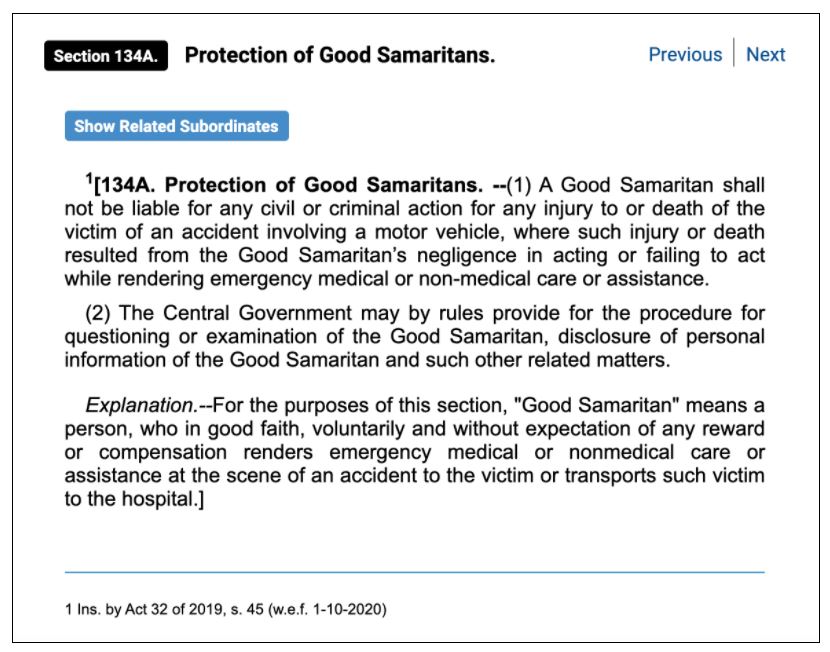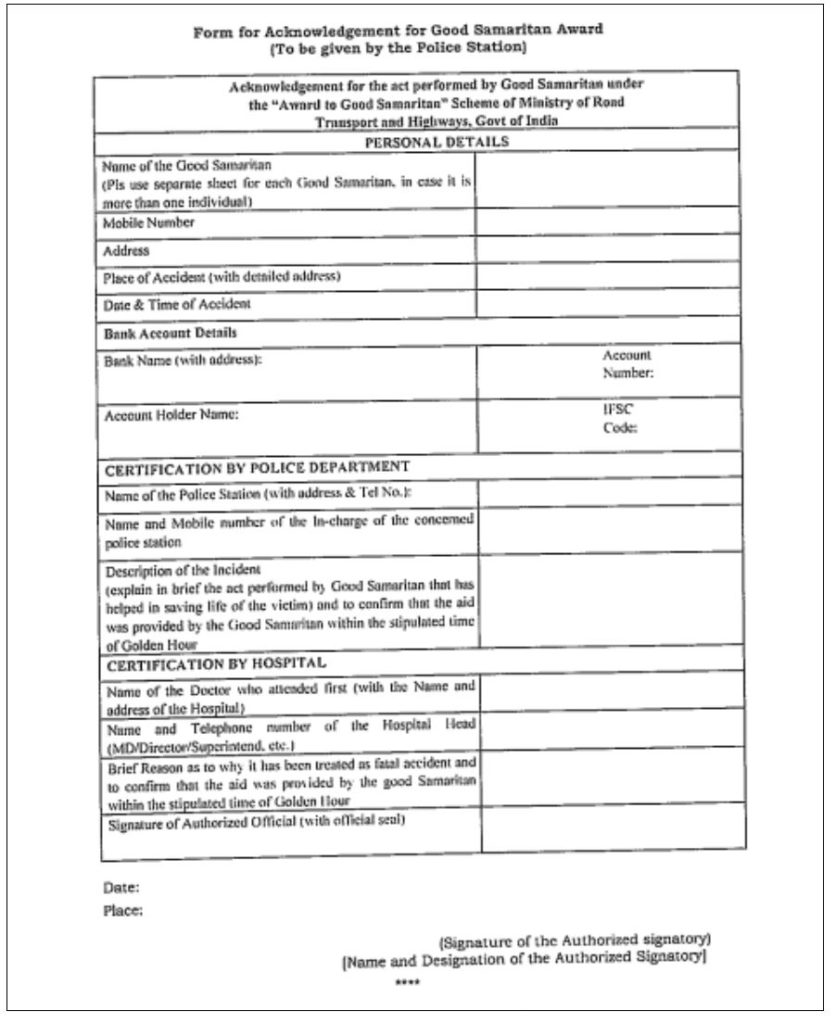The Ministry of Road Transport & Highways (MoRTH) recently issued guidelines for a new scheme to extend cash award of Rs. 5,000 to the ‘Good Samaritan’ who provides emergency assistance to victims of fatal accidents. Here is a review of India’s journey from recognizing the ‘Good Samaritan’ to extending them rights and now a cash award.
Injuries in road accidents are among the top 10 causes of deaths globally. In 2019, over 4.49 lakh road accidents were reported in India and over 1.51 lakh persons lost their lives in these accidents. Between 2010 and 2019, a total of 14.4 lakh deaths have been reported due to road accidents in the country.
India ranks first in terms of the absolute number of deaths in road accidents among 199 countries, and deaths due to road accidents in India alone account for 11% of the accident-related deaths in the world. In India, road injuries are the leading cause of death among young adult males. With increasing vehicle population and vehicle density on roads, the probability of accidents & deaths due to them is more than before.
50% of the fatalities in road accidents could have been averted if prompt medical service was given
One major reason for the high fatalities in road accidents is the lack of timely medical treatment for victims. According to a 2006 report of the Law Commission of India, 50% of the fatalities could have been averted if victims were admitted to a hospital within the first one hour, which is called the golden hour. Lives could be saved if emergency medical treatment is provided immediately. Unfortunately, many bystanders and passers-by are hesitant to help the injured accident victims because of the fear of police harassment, detention at hospitals, and prolonged legal formalities. To encourage people to come forward and render help to the accident victims, legal protection, and perks for ‘Good Samaritan’ are necessary.
A ‘Good Samaritan’ is a person who, in good faith, without expectation of payment or reward and without any duty of care or special relationship, voluntarily comes forward to administer immediate assistance or emergency care to a person injured in an accident, or crash, or emergency medical condition, or emergency situation. A ‘Good Samaritan’ law is supposed to safeguard such individuals from harassment & legal hassles they may have to undergo for saving the lives of victims.
PIL in 2012 brought attention to the issue of protecting ‘Good Samaritans’
A Public Interest Litigation (PIL) filed in the Supreme Court in 2012 requesting the Court to safeguard ‘Good Samaritans’ who come forward to help the injured, paved the way for legal protection and encouragement of ‘Good Samaritans’. Following the apex court’s orders, the Ministry of Road Transport and Highways (MoRTH), in 2015, notified guidelines about the protection of ‘Good Samaritans’ as an interim measure until appropriate legislation is made by the Union government. Later in 2016, MoRTH issued a Standard Operating Procedure for the examination of ‘Good Samaritans’ during the trial.
Motor Vehicles (Amendment) Act, 2019 included provisions for ‘Good Samaritans’ in legislation
A new section 134A titled ‘Protection of Good Samaritans’ was inserted through the Motor Vehicles (Amendment) Act, 2019, which provides that ‘a Good Samaritan shall not be liable for any civil or criminal action for any injury to or death of the victim of an accident involving a motor vehicle, where such injury or death resulted from the Good Samaritan’s negligence in acting or failing to act while rendering emergency medical or non-medical care or assistance and that the Central Government may by rules provide for the procedure for questioning or examination of the Good Samaritan, disclosure of personal information of the Good Samaritan and such other related matters.’

In 2020, MoRTH published relevant rules laying down the ‘Rights of Good Samaritan’. The rules make it clear that it is the voluntary choice of the ‘Good Samaritan’ to disclose his/her name, identity, address or any such other personal details and no police officer or any other person shall compel a ‘Good Samaritan’ to do so.
The scheme for awarding ‘Good Samaritans’ was recently announced by MoRTH
On 05 October 2021, MoRTH issued guidelines for the ‘Scheme for grand of award to the Good Samaritan’, to motivate the general public to help the road accident victims in emergency situations. The scheme will be effective from 15 October 2021 and operational until 31 March 2026.
Under the scheme, any individual who has saved the life of a victim of a fatal accident involving a motor vehicle by administering immediate assistance and rushing to a hospital within the ‘Golden Hour’ of the accident to provide medical treatment would be eligible for a cash award and certificate of appreciation for their good deed. Golden hour is defined as the period of an hour post a traumatic injury during which the likelihood of preventing death by giving immediate medical care is the highest. A fatal accident is one which leads to a major surgery, brain injuries, spinal cord injuries, or at least 3 days of hospitalization.
Each ‘Good Samaritan’ will be given a cash award and certificate
As per the guidelines, each ‘Good Samaritan’, subject to the eligibility criteria, will be given a cash award of Rs. 5,000 per incident. That is, even if they save the lives of more than one person in a single incident, they will be eligible for a cash award of Rs. 5,000 only. If more than one ‘Good Samaritan’ saves the life of a victim, then the Rs. 5,000 cash awards will be split equally among them. If more than one ‘Good Samaritan’ saves the life of more than one victim of an accident, then they will be given a cash award of Rs. 5,000 per victim saved subject to a maximum award of Rs. 5,000 per ‘Good Samaritan’. Further, an individual ‘Good Samaritan’ can be awarded a maximum of five times in a year.
Ten worthiest ‘Good Samaritans’ in the country will be awarded Rs. 1 lakh, certificate, and trophy
Apart from the cash award, a ‘Certification of Appreciation’ will also be provided to the ‘Good Samaritans’. Additionally, the scheme has also announced the presentation of 10 national-level awards to be handed out annually for the worthiest ‘Good Samaritans’ among those who have been awarded the whole year. The national-level award winners will get a cash award of Rs. 1 lakh each along with a Certificate and trophy during National Road Safety Month (NRSM) in Delhi.
What is the procedure to identify & award the ‘Good Samaritan’?
When the ‘Good Samaritan’ informs the police first about the accident, the police upon receiving the required details from the Doctor will provide an acknowledgement to the ‘Good Samaritan’ on the official letter pad. The acknowledgement would contain details such as name, phone number, and address of the ‘Good Samaritan’, details of the accident such as time, place, and date, and how the ‘Good Samaritan’ helped in saving the life of a victim. If the ‘Good Samaritan’ takes the victim to the hospital first, then the hospital must provide all the details to the concerned police station, and the police must provide an acknowledgement to the ‘Good Samaritan’. The standard format for acknowledgement is provided in the guidelines.

Committees at the District, State, and National level will be set up for award purpose
A copy of the acknowledgement provided by the police is sent to the District Level Appraisal Committee comprising of District Magistrate, Chief Medical and Health Officer, RTO, and SSP. The committee will review and approve the proposals on a monthly basis. The cases are then sent to the concerned State/UT Transport Department for making the payment to the Good Samaritans. For the national-level awards, the State level committee of each State/UT must nominate the three most worthy proposals on a yearly basis. An Appraisal Committee of the MoRTH would review the proposals received from the States/UTs and select the best ten ‘Good Samaritans’ of the year.
An initial grant of Rs. 5 Lakhs will be provided by MoRTH to the Transport Department of the State/UT for making payment to the ‘Good Samaritans’ which would be reimbursed by the Ministry on monthly basis. A separate account is to be created for this purpose.
Different types of ‘Good Samaritan’ laws exist across the World
In countries like the United States of America (USA), differing laws exist across each of the 50 states regarding the ‘Good Samaritan’. For instance, the ‘Good Samaritan’ law in Minnesota makes it a legal obligation for the passers-by to help a person in an emergency, failure of which would fetch a penalty. Meanwhile, the law in Delaware safeguards the ‘Good Samaritans’. Furthermore, unlike in India where the ‘Good Samaritan’ policy is restricted to saving persons in road accidents, the ‘Good Samaritan’ laws in certain states of the USA are applicable to all emergency situations. In fact, there are ‘Good Samaritan’ laws exclusively for helping persons with Drug Overdose and even Environmental Good Samaritans laws. In many western countries, the moral duty to stop and render treatment to an injured or ill person has been recognized instead of making it a legal requirement.
Awareness & Quick Decision making for Award money is necessary
While the policy to encourage the ‘Good Samaritan’ with a cash award is a step in the right direction, this would be successful only when there is widespread awareness about both the award and the procedure involved. Further, the procedure & timelines to extend cash award to the ‘Good Samaritan’ should be followed scrupulously without any delay. Unless these happen, the scheme would not be successful.
Featured Image: Good Samaritans laws


